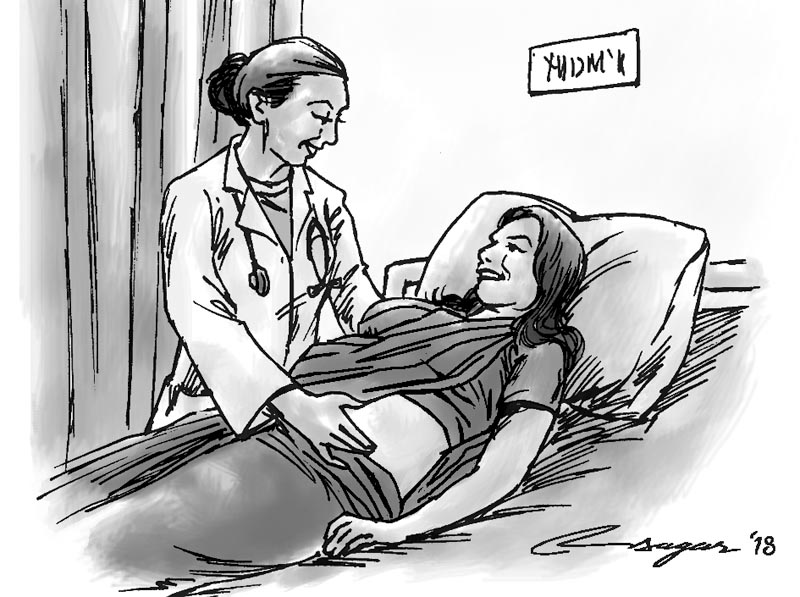Obstetric fistula: Let’s work to end it
Obstetric fistula, a hole in the birth canal, is one of the most serious injuries of childbirth caused by prolonged and difficult labour in the absence of timely and adequate medical care. This is preventable and in most cases treatable
A few months ago, a team of doctors was discussing a dreadful reproductive health situation in Nepal. Dr Aruna Karki, a senior gynaecologist at Kathmandu Model Hospital, showed photographs of women suffering from obstetric fistula. They suffered both physically and mentally. The medical condition was having profound consequences on their families as well.
If the smell of urine emanates from a woman’s body, people usually avoid her. Or they will assume that she is mentally ill. Only a few understand that she may be suffering from obstetric fistula, a medical condition in which a hole develops between either the rectum and vagina, ureter and the vagina, or between the bladder and vagina due to difficulties in childbirth. It can result in incontinence. Obstetric fistula, a hole in the birth canal, is one of the most serious injuries of childbirth caused by prolonged and difficult labour in the absence of timely and adequate medical care.
A 30-year-old mother recently shared her story with health workers at Kathmandu Model Hospital. She had been suffering from obstetric fistula for 10 years. After the birth of her first child 10 years ago, she started having a problem of continuous leaking of urine and faeces. When she came to Kathmandu, according to her, a renowned gynaecologist examined her and gave her medicine. But when there was no improvement, she informed the doctor about her situation. The doctor then told her there was nothing she could do about the condition and that she had to live with that. But thankfully, her husband was very supportive. After seeking treatment at various places, the couple finally learned that Kathmandu Model Hospital was providing free treatment for obstetric fistula. She is living a healthy life now.
In another incident, a 40-year-old Dalit pregnant woman was brought to BP Koirala Institute of Health Sciences with a perforated uterus. She was pregnant with her sixth child and going through labour pain for more than a week. After operation, the child could not be saved, but she survived. But she developed a fistula. After suffering from the condition for seven years, she was recently treated. “I am happy to have been treated for the problem of leaking urine,” she shared.
These two cases show obstetric fistula can be cured. The only problem is women in our country lack right information on the medical condition and the place where treatment is possible.
According to Dr Mohan Chandra Regmi at the BPKIHS, which also provides free treatment and care for fistula patients, the number of women suffering from this medical condition could be between 5,000 and 10,000 and there are 400 new cases every year.
Obstetric fistula was a neglected problem until a few years ago. The medical condition started getting attention after a research conducted by the UNFPA in 2011 which showed many women were suffering from obstetric fistula in Nepal.
According to Dr Karki, poor women lack access to health care centres or hospitals during delivery, are malnourished and victims of gender-based violence. Prolonged labour and lack of information on where to go for treatment often complicate the condition. “Before I got the training, even I did not know how to treat women suffering from this condition. I and Dr Ganesh Dangal got an opportunity to get training in Ethiopia, where a special hospital is established for treating women with obstetric fistula. In Africa, this is a very common problem as female genital mutilation is a common practice,” she says. It takes about three-four weeks for operation and sometimes women have to be operated twice. So, sometimes patients or their family members get impatient and avoid treatment.
A special project has been launched to provide free treatment to women suffering from obstetric fistula and in the last three years 135 patients have been treated. But due to lack of information about the treatment of the condition, many women do not get treated for fistula.
There is a need to raise awareness about the medical condition and family members also can a play a crucial role in taking women to hospital for treatment. Women suffering from obstetric fistula need care and treatment; they should not be made an object of neglect.
Even health workers in Nepal are unaware about this medical condition.
In Makawanpur district I had come across a situation in which health workers said they did not know about the medical condition. When patients visit health facilities with the problem of leaking urine, they are often given iron tablets or Vitamin B complex. The general assumption among health workers is leaking of urine is “due to weakness or anaemia”.
Massive awareness campaigns are required to end obstetric fistula. The government should come up with some concrete plans to raise awareness about this treatable problem. Ensuring access to quality sexual and reproductive health services, eliminating gender-based social and economic inequities, preventing child marriage and early childbearing, promoting education and broader human rights, fostering community participation in finding solutions could be various ways to save women from this medical condition, which not only makes them physically and mentally unwell but also puts them at risk of being socially ostracised.






